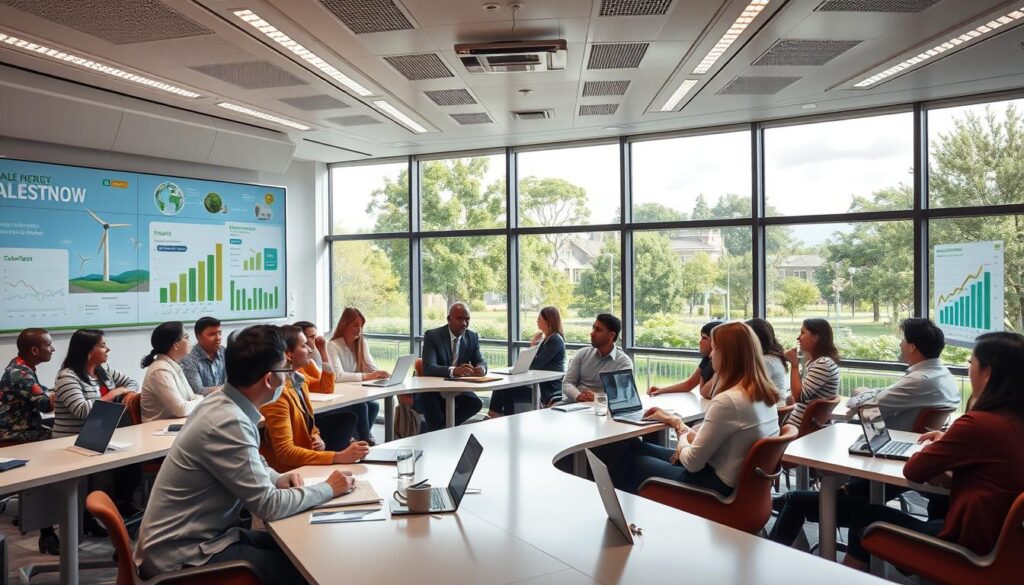The world faces urgent challenges from climate change. This makes it crucial for business leaders to understand sustainability. An MBA in Climate Policy is a new path for leaders. It gives them the skills to make real changes in business.
This program connects business, policy, and caring for the environment. It helps future leaders deal with climate change’s many sides. They learn about the economy, laws, and new green technologies and business ideas.
Key Takeaways
- Gain a deep understanding of the intersection between business, climate policy, and sustainability.
- Develop analytical and problem-solving skills to address complex environmental challenges.
- Acquire the knowledge and expertise to lead organizations towards a more sustainable future.
- Explore emerging opportunities in the renewable energy sector, green finance, and sustainable supply chains.
- Leverage capstone projects and internships to apply classroom learning to real-world scenarios.
Understanding the Business of Climate
Climate change is changing the global economy, bringing big risks and big chances for businesses. The world needs leaders who can handle the climate challenge more than ever.
Preparing Tomorrow’s Leaders for the Climate Challenge
The Tuck School of Business is working hard to prepare future leaders. We give them the skills and knowledge they need for the new climate economy. Through hands-on learning and teamwork, we’re getting students ready for the big challenges ahead.
Climate Change: Risks and Opportunities for Growth
- The Centers for Business, Government & Society and Revers Center for Energy offer special funds for internships on climate change. Students like Tobin Krieg T’21, Grant Schaller T’21, and Posie Holmes T’21 get real-world experience.
- Tuck has courses like Global Insight Expedition (GIX) that focus on renewable energy and sustainable economies. These courses help students understand climate change better.
- Students can work on independent projects about greenhouse gas emissions and clean energy blockchain. This lets them tackle real-world problems.
Tuck is creating a space for innovation and practical learning. We’re getting ready the next leaders to face the climate challenge head-on.
“Climate change is a big topic in business, with guest speakers like Secretary Madeleine Albright, Beto O’Rourke, and Auden Schendler. They inspire the next generation of leaders in energy and sustainable business.”
| Key Insights | Implications |
|---|---|
| Younger people are willing to give up a bit of their investment for socially or environmentally good causes. | Businesses must adapt to meet the evolving preferences and values of the next generation of consumers and investors. |
| ESG verification is influencing the debate over requiring corporations to report their carbon emissions. | Corporations face increasing pressure to improve their environmental, social, and governance (ESG) performance, driving the need for strategic climate action. |
| Encouraging foolish business ideas might play a crucial role in addressing the climate crisis. | Fostering a culture of innovation and experimentation is essential for identifying effective solutions to complex environmental challenges. |
ClimateCAP: The Premier Learning Resource

ClimateCAP is the top choice for MBA students wanting to learn about climate business. It started in 2016 and works with 32 business schools. It also has funding from the Hearst Foundations and a team led by Jessica Wingert.
MBA Summit: Discussing Climate Change Implications
The MBA Summit is the core of ClimateCAP. It’s a big event where students, leaders, and scholars talk about climate change’s impact. The latest summit in Austin, Texas, had Q&A sessions for students to talk with experts.
MBA Academy: Learning from Industry Experts
ClimateCAP also has the MBA Academy. It’s a series of online sessions with insights from experts. Topics include sustainability, renewable energy, and policy.
In seven years, ClimateCAP has grown a lot. It’s now a key resource for MBA students learning about climate change. Students love it, showing the need for climate-focused business education.
The Educator Roundtable at ClimateCAP Summits shows how business schools are changing. It helps students, teachers, and industry folks connect. ClimateCAP is shaping the next climate-aware business leaders.
MBA In Climate Policy

Climate change is a big challenge that needs a mix of business skills, policy knowledge, and sustainability understanding. The MBA in Climate Policy program at Tuck School of Business prepares future leaders. It teaches them how to handle the low-carbon future’s complexities.
Curriculum: Interdisciplinary and Experiential
The MBA in Climate Policy curriculum offers a deep dive into business, policy, and sustainability. Students learn about renewable energy, energy markets, governance, and stakeholder management. This hands-on learning helps students solve real-world sustainability and environmental policy problems.
Capstone Projects and Internships
The MBA in Climate Policy program focuses on capstone projects and internships. These experiences let students work with leading companies in sustainability, policy, and climate action. Students improve their analytical and problem-solving skills, ready to lead in the low-carbon future.
| Degree Type | Entry Terms | Mode of Study | Location |
|---|---|---|---|
| Master of Science | Fall, Spring, and Summer | On Campus, Online | Washington, D.C. |
| Requirements | Time to Complete | Career-Enhancing Focus Areas | Wide Array of Electives |
| 10 courses | 12 – 24 months | Energy, Climate Change, Policy, Modeling, and Social Perspectives in Climate and Energy | Solar Energy: Science, Technology, and Policy, Global Energy Policy, Adaptation to Climate Change, The Electric Grid: Technology and Policy, Understanding Public Attitudes for the Communication of Climate and Energy Policy |
Tuck’s Climate Change Initiatives

Tuck School of Business leads in tackling climate change. It does this through cross-campus collaborations and initiatives. The Revers Center for Energy and the Center for Business, Government & Society team up with other Dartmouth groups. They include the Thayer School of Engineering and the Arthur L. Irving Institute for Energy & Society.
Together, they offer students a deep dive into climate-related issues and solutions.
Cross-Campus Collaborations
Tuck’s efforts against climate change reach beyond the business school. It forms interdisciplinary partnerships across Dartmouth. Students get to work on sustainability projects through workshops and field visits.
These are organized by the Revers Center and the Center for Business, Government, and Society.
Independent Projects and Student-Run Funds
Tuck students also delve into climate-related topics through independent projects and student-run funds. The Tuck Social Venture Fund is a key example. It lets students invest in early-stage social enterprises with big environmental and social impact.
Claire Kadeethum T’24 is looking into climate tech ventures for the Tuck Social Venture Fund. She’s learning about the complex calculus of impact investors. After graduation, Claire aims for an energy-focused role at Bain & Company.
Tuck’s climate change initiatives show its dedication to training the next business leaders. These leaders will face the sustainability challenges of the future.
Navigating the Low-Carbon Future

As the world moves towards a low-carbon future, leaders need special analytical and problem-solving skills. An MBA in Climate Policy teaches students to mix business, policy, and sustainability. This helps them find and use effective solutions to big climate challenges.
This interdisciplinary approach gets students ready to lead change. They can push for sustainable practices and policies in their work and communities.
Analytical and Problem-Solving Skills
The MBA in Climate Policy program focuses on analytical and problem-solving skills for climate change. Students learn to collect and analyze climate data and find ways to deal with sustainability challenges. They also come up with new strategies to face climate change impacts.
This training helps graduates make smart choices and spot emerging trends. They can then put effective climate solutions into action in their work and communities.
Combining Business, Policy, and Sustainability
The MBA in Climate Policy program lets students connect business, policy, and sustainability. They get deep knowledge in renewable energy, energy markets, environmental policies, and corporate sustainability. This helps them understand the complex mix of these areas.
With this broad view, they can create plans that meet commercial goals, protect the environment, and consider stakeholder needs. This way, they help build a sustainable future.
“The global economy is undergoing a transformation towards a low-carbon future, necessitating collaboration and coordination across emerging systems.”
| Key Insights from Recent ClimateCAP Events | Highlights |
|---|---|
| ClimateCAP Summit 2024 | Featured discussions on topics such as recentering equity in the climate transition, corporate political responsibility, decarbonizing the fashion supply chain, and onshoring clean energy supply chains. |
| ClimateCAP Summit 2018 | Addressed areas like responding to climate risks, hidden risks and opportunities in framing the climate issue, and the future of energy. |
| ClimateCAP Themes | Integrating climate into MBA education, the role of the CFO in sustainable business acceleration, and the impact beyond financial return. |
Career Opportunities for Climate Leaders

Graduates of the MBA in Climate Policy program at Tuck are well-prepared for many career paths. They know a lot about sustainable business and climate policy. This makes them great for jobs that help create a greener future.
Private Sector: Sustainable Business Practices
In the private sector, Tuck’s climate leaders can help companies go green. They can make sure businesses use renewable energy and reduce waste. Jobs might include working in corporate sustainability or renewable energy project management.
Public Sector: Policy and Governance
Graduates can also work in government, shaping climate policies. They can advise on environmental laws and help non-profits. Jobs might be in climate policy analysis or sustainable urban planning.
The demand for climate experts is high. Tuck’s MBA in Climate Policy graduates have many career options. They can help solve climate problems and lead to a greener future.
| Career Opportunity | Average Salary | Job Outlook Growth |
|---|---|---|
| Renewable Energy Engineer | $92,120 | 4% |
| Environmental Lawyer | $148,910 | 9% |
| Urban Planner | $75,950 | 7% |
| Environmental Engineer | $92,120 | 4% |
| Environmental Data Analyst | $73,230 | 8% |
| Environmental Emergency Planner | $73,230 | 8% |
“The career prospects for Tuck’s MBA in Climate Policy graduates are vast and diverse, spanning industries and sectors. These individuals are poised to make a meaningful impact in addressing the challenges of climate change and driving the transition to a more sustainable future.”
Global Impact and Stakeholder Engagement

Graduates of the MBA in Climate Policy program are ready to make a big global impact. They blend business skills, policy knowledge, and sustainability. They can work with many stakeholders, like business leaders and policymakers, to find sustainable solutions.
These climate leaders use their interdisciplinary knowledge and problem-solving skills to help us move towards a sustainable and resilient future. They know a lot about renewable energy, energy markets, governance, and corporate sustainability. This helps them tackle the complex issues of environmental protection, policy analysis, and climate data.
By working together and engaging with stakeholders, these professionals can lead to real action on climate. They help tackle the big sustainability challenges that companies and communities face worldwide.
“Impact Investing has surged into the mainstream of global money management, now affecting trillions of dollars of assets.”
The MBA in Climate Policy program gives graduates the tools to tackle the low-carbon future. They can help create new environmental policies and sustainable business practices.
Also Read : Funding Your MBA in Sustainability: Scholarships and Financial Aid Options
Conclusion
The world faces a big challenge with climate change. An MBA in Climate Policy from Tuck is a key solution. It gives students the skills to lead in creating a sustainable future for business worldwide.
This program mixes climate science, economics, policy, and sustainable business. It prepares students to drive change. They can help companies switch to renewable energy, create new strategies for climate risks, or push for policy changes.
As companies and governments deal with climate change, the need for experts will grow. Tuck’s MBA in Climate Policy prepares students for this. They become ready to face the climate change crisis as global business leaders of tomorrow.
FAQs
Q: What is the focus of the MBA in Sustainability and Climate Solutions program for the 2023-2024 academic year?
A: The MBA program focuses on developing change agents who are able to understand and implement sustainable practices in a variety of political and economic contexts. It emphasizes the importance of law and policy in addressing environmental challenges.
Q: What types of coursework can students expect in this MBA program?
A: The MBA curriculum includes foundational concepts of environmental law, resource economics, and policy making, allowing students to develop a comprehensive understanding of policy issues and challenges related to sustainability.
Q: How does the MBA in Sustainability and Climate Solutions prepare students for decision-making in non-profit or NGO sectors?
A: The program provides students with the necessary frameworks and tools to improve environmental decision-making, equipping them to tackle policy challenges faced by non-profit organizations and NGOs effectively.
Q: Are there any specializations available within the MBA program?
A: Yes, the MBA program offers a specialization that focuses on sustainability and climate solutions, allowing students to tailor their education to their career goals and interests.
Q: What is the admission process for the MBA in Sustainability and Climate Solutions?
A: The admission process includes submitting a completed application, academic transcripts, letters of recommendation, and a personal statement. Pre-approved candidates may also have an interview with an academic advisor.
Q: Does the MBA program include practical experiences or projects?
A: Yes, the program includes opportunities for hands-on projects and collaborations with organizations, allowing students to apply their learning in real-world settings, particularly in addressing policy challenges.
Q: How does the MBA program contribute to resilience in environmental governance?
A: The MBA program emphasizes resilience by teaching students how to implement sustainable practices and policies that can adapt to changing environmental conditions and societal needs.
Q: Can the credits from this MBA program count toward further academic pursuits?
A: Yes, the credits earned in the MBA program can count toward other master’s or doctoral programs, particularly those focused on sustainability, climate solutions, or related fields.
Q: What career opportunities are available for graduates of this MBA program?
A: Graduates can pursue a variety of career paths in sectors such as government, non-profits, NGOs, and corporate sustainability roles, where they can address policy issues and implement sustainable practices.

